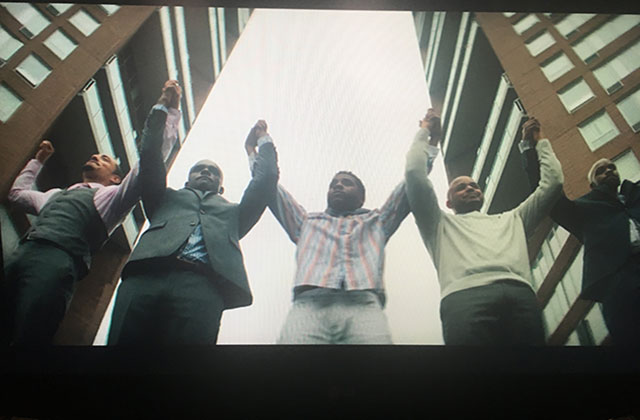“When They See Us,” the highly-anticipated four-part series that chronicles the real lives of the five 14- to 16-year-old Harlem teenagers of color called the Central Park Five, premieres worldwide on Netflix today (May 31). By now, everyone knows Antron McCray, Kevin Richardson, Yusef Salaam, Raymond Santana and Korey Wise were convicted of a rape they did not commit thirty years ago. That is what Academy Award-winner Ava DuVernay—who co-wrote and directed all four parts—wants us to remember. Five innocent Black and Latinx boys is what she wants us to see.
Part one opens in Harlem on April 19, 1989. A boy is playing with a baseball in a room. His father calls him to the kitchen table for lunch, and they banter over the Yankees. In the following street scene, another teenager is holding a trumpet case, telling his sister how good he felt stepping up in school earlier that day. DuVernay uses these scenes to illustrate the ordinariness of these boys who hung out with their friends, talked to their dads and crushed on girls.
Then we’re introduced to the police team in charge of finding a suspect for the recent rape and beating of a jogger in New York City’s Central Park. “Every young Black male who was in the park last night is a suspect in the rape of that woman,” says Linda Fairstein, the then-sex crimes chief in the Manhattan district attorney’s office, played by Emmy Award-winner Felicity Huffman.
The railroading that ensues is hard to watch, as the police threaten and mislead the families, beat the boys—who were all complete strangers to each other—and then got them to lie on each other and sign false confessions. By the end of part one, we know Antron, Kevin, Korey, Raymond and Yusef. We are also terrified for them.
In part two, the narrative has been written. We’re reminded how the story spread on every radio and television set. How Donald Trump paid for an $85,000 ad against five children that read, “Bring Back the Death Penalty.” How activists rallied for the boys outside the courthouse after their arrests. How the boys faced systemic racism at every turn.
“Where is the line?” Fairstein asks at one point.
We see the prosecutor at a moral crossroad, and we see her make the wrong choice. Even though these events were 30 years ago, we expect justice, because the trial proved no DNA evidence from the crime scene matched any of the teens. We expect to hear “innocent,” and when we don’t, it hurts. Bad.
Part three fans out to explore how the families are coping outside and how the boys are doing inside, eventually following them as they are released from prison one-by-one over time, now grown into men struggling to adjust to life on the outside. DuVernay never lets us forget just how young they were when they were arrested in their flat tops and school uniforms. She wants us to see that these were sweet kids who were sent to prison because the justice system is racist.
“When they say boys will be boys, they’re not talking about us,” Raymond says before returning to prison for dealing drugs. “When do we ever get to be boys?”
The final chapter dives deep into Korey’s case. He was 16 years old in 1989, and was separated from the other four boys, who were 14 and 15 years old. When Korey was first imprisoned in 1990, he was seven miles from home on Rikers Island. By 2001, he was 266 miles away from Harlem in Auburn Correctional Facility in upstate New York. Korey was the last of the five to complete his sentence for the jogger case, and he experienced some of the most violent attacks imaginable. It’s one of the most heart-wrenching parts of the series.When the news of their innocence broke in 2002, the men learned just as we did—via the media—that the district attorney’s office had exonerated them of all crimes based on eyewitness confessions. Watching “When They See Us,” the moment is bittersweet. We knew they were innocent all along.
When the now Exonerated Five is finally shown all together, free, at a Harlem celebration, the emotions are overflowing. It’s easy to understand why the $41 million settlement issued by a New York State federal judge in 2014 does nothing to compensate for the six to 14 years of their lives that they lost. Have your tissue ready.
The series stars a massive, stellar cast, from the young actors who play the boys to the award-winning vets who portray their family, friends and foes, including Emmy Award-nominees Michael K. Williams and Niecy Nash; Academy Award-nominee Vera Farmiga; Emmy Award-winners Felicity Huffman, John Leguizamo and Blair Underwood; Emmy and Grammy Award winner Christopher Jackson.
